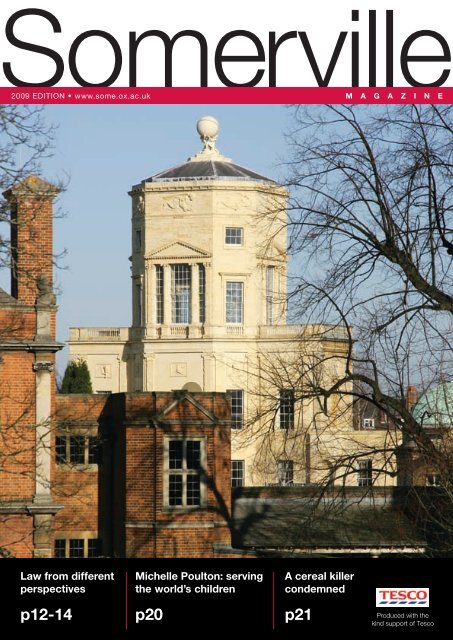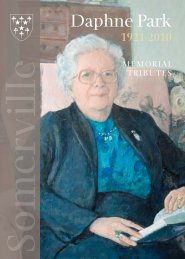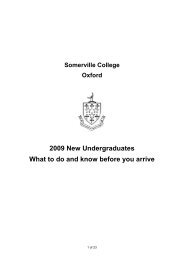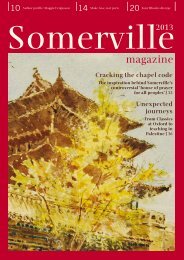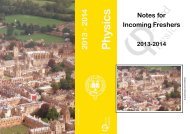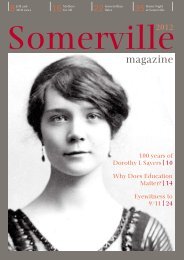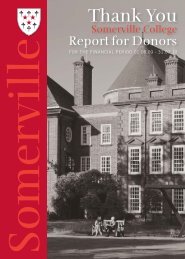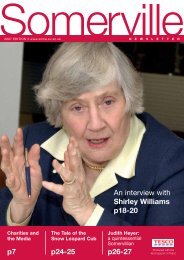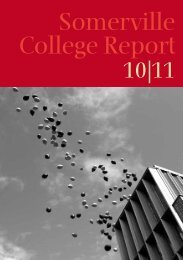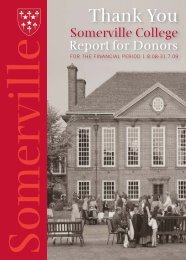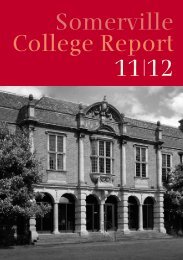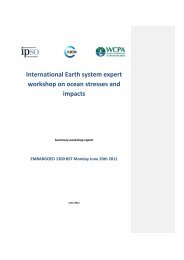p12-14 p21 p20 - Somerville College
p12-14 p21 p20 - Somerville College
p12-14 p21 p20 - Somerville College
- No tags were found...
Create successful ePaper yourself
Turn your PDF publications into a flip-book with our unique Google optimized e-Paper software.
omerville2009 EDITION • www.some.ox.ac.uk M A G A Z I N ELaw from differentperspectivesMichelle Poulton: servingthe world’s childrenA cereal killercondemned<strong>p12</strong>-<strong>14</strong><strong>p20</strong><strong>p21</strong>Produced with thekind support of Tesco
contentsEver Increasing ChallengesThe challenge facing agriculture is to provide ahealthy and affordable diet for our growingpopulation while mitigating climate change. Thismust be achieved without further damage to ourplanet and while providing a livelihood for farmersand ensuring the welfare of our food animals. Thisis at the heart of the research and developmentprogrammes at the Food Animal Initiative (FAI) onthe Oxford University’s 1000 acre farm at Wytham.A new vision is being forged for farming and,while continuing to expand its increasinglyrecognised work on farm animal welfare, FAI hasbroadened its research programme in response tothe new challenges. FAI has developed the ‘threeEs’ as a framework for addressing agriculturalsustainability; farming systems must deliver ethical,environmental and economic sustainability.Tesco, already committed to high standards ofanimal welfare and environmental care, has sponsoredFAI from the beginning and is a str ong supportertoday. FAI now operates international projects, withmodel farms in China and Brazil in cooperation withthe World Society for the Protection of Animals andthrough the European Farmers Network in partnershipwith Compassion in World Farming.The on-going collaboration with animalbehaviourist Professor Marian Dawkins of <strong>Somerville</strong><strong>College</strong> is key to developing systems of foodproduction, such as the integration of poultryproduction with tree planting which creates benefitsto both the environment and bird welfare. At theUniversity farm a long term environmental study,carried out by the Centre for Ecology and Hydrology,has shown that FAI farming practices have resultedin substantial improvements to biodiversity.FAI has recently published a report documentingthe sustainability of upland sheep farming systemsand their potential to have a zer o carbon footprint.The report concentrates on the balance between theemission of greenhouse gases and the sequestrationof carbon but also considers other aspects ofenvironmental care at farm level, includingbiodiversity, animal feed sourcing policies, direct andindirect energy use, pollution and water usage.There is one final point of great importance.FAI’s work does not just stay within the r ealm ofresearch. Tesco recognises the significantcontribution farming activities make to theenvironmental footprint of food products and theTesco agricultural team and FAI are workingtogether with supplying farmers to incorporate bestenvironmental practice on the farm.<strong>Somerville</strong> <strong>College</strong>Woodstock RoadOxford OX2 6HDTelephone 01865 270600Fax 01865 270685www.some.ox.ac.uk3 Principal’s message4 News in briefMichala Butterfield (née Emmett) appeal5 A message from the <strong>Somerville</strong> Association6 News<strong>Somerville</strong> represented at the 2008Beijing Olympics7 Afghan refugee joins <strong>Somerville</strong>Commemorating Somervillians who have died8-9 <strong>Somerville</strong> travel awards10 Risky business11 Music at <strong>Somerville</strong>12-<strong>14</strong> Law from different perspectives15 <strong>Somerville</strong> Annual Fund – helping the newgeneration of Somervillians16-17 A postdoctoral research journey to Germany:the welfare state; public service and the natureof Somervillians18 From <strong>Somerville</strong> to Baghdad: a profile of ayoung diplomat19 India’s ‘economic miracle’ – miracle for whom?20 Michelle Poulton: serving the world’s children21 A cereal killer condemned22 An editor’s role in a digital world24-25 Four Fellows celebrate their retirement26-27 <strong>Somerville</strong> Literary Luncheon 2009:A N Wilson: Four Somervillian Writers(with booking form)28 Events list 2009design and print dsprint I redesign 020 8805 9585page 2 • <strong>Somerville</strong> • 2009 edition
Principal’smessageThe last few weeks at <strong>Somerville</strong> have featur eddramatic changes in our environment.The Estates Department of theUniversity has commissioneddemolition of most of the buildingsthat constituted the Radcliffe Infirmary,apart from the main Infirmary buildingbeyond the fountain, the out-patientsbuilding immediately adjacent to <strong>Somerville</strong>on the Woodstock Road, and St Luke’sChapel on the opposite corner of the site.Noise has been intermittent and lessevident than we feared, as has dust.The prize for weathering this has beena new and wonderful view of theObservatory at Green Templeton <strong>College</strong>[the two colleges merged from October1st 2008], from the Quad outsideMaitland, and the disappearance of themonstrous surgical block, which loomedover our handsome library, which nowagain constitutes the skyline from<strong>Somerville</strong>, looking north.The most exciting aspect of thedevelopments ‘next door’, however, isthe opportunity offered to <strong>Somerville</strong> bythe University to lease [long term] a stripof land along most of our boundary. Thecity planners have required that theUniversity improves the view from what isnow known as the Radcliffe ObservatoryQuarter. The rear view of <strong>Somerville</strong>’sbuildings, displeasing as it is to theplanners, is serving the <strong>College</strong> well inleading to our having this ‘once in alifetime’ opportunity. The two buildings ofstudent accommodation will now providearound 68 en suite rooms and supportingfacilities. Planning permission for thisdevelopment has been submitted and weawait the outcome. Students have beenconsulted by the architects about thedesign of the rooms.Fortunately, we have now completedour programme of refurbishment of the<strong>College</strong> buildings, overseen by theTreasurer, Helen Morton, over the lastseveral years. The remaining majorproject is repairing the roof of Darbishire,which cannot be completed until thesummer, owing to the limited availabilityof the particular kind of Cotswold Stoneslate which the local conservation officeris requiring us to use [like for like].Writing in the middle of the academicyear, the freshers of 2008, 122 of them,have settled in to their new lives. Thisyear is unique in that men are in themajority, with 68 of them to 54 women.57 have come from maintained schools,48 from independent ones and 17 arefrom overseas and other settings. Wecontinue to have an above averageproportion of undergraduates from themaintained sector, and of those on theUniversity / <strong>College</strong> bursary scheme[receiving the Oxford OpportunityBursary]. One of those freshers, SeanMorris, Medicine, played in the VarsityMatch at Twickenham, a rareachievement at such an early stage.There are 37 new graduate students,who have also acclimatized themselvesto their new opportunities. Our newestFellow, Steve Simon, Physics, joined usfrom the U.S. in January.There is much activity in makingappointments at the moment. Tomaintain our academic provision we areseeking a Tutorial Fellow in Philosophy,and one in Classics.We have just recruited a DomesticBursar, Carol Reynolds, and arerecruiting a Development Director tosucceed Jacqui Manning who left the<strong>College</strong> in December. Soon we shallbegin the process of appointing asuccessor for Pauline Adams who retiresin the autumn.<strong>College</strong> arranged, jointly with the<strong>Somerville</strong> Association, a wonderfulseries of reunions for former pupils of ourretiring fellows, Carole Jordan, Jo Peach,Adrianne Tooke and Hilary Ockendon inthe summer and autumn. Not only wer ethese very well attended by alumni keento meet ‘their tutor’, but also gr eatgenerosity was shown in donations,including from many who could notattend, to support Physics, Chemistry,Modern Languages and Mathematics.This provides me, once again, with theopportunity to thank everyone who hassupported the <strong>College</strong> recently, whether bygift or in contributing time and effort to theorganization of meetings of the Association,in the many forms that those take, andgiving great pleasure to all who attend.As the end of my Principalship isbrought more clearly into focus by theelection of my successor, which is nowproceeding, I am also increasingly awareof how important members of the<strong>Somerville</strong> Association are, and havebeen, during the past twelve years.Fiona Caldicott2009 edition • <strong>Somerville</strong> • page 3
NEWS IN BRIEFProfessor Aditi Lahiri, Fellow and Professor ofLinguistics, whose work on Bengali dialects iswidely recognised, is to head a new faculty ofLinguistics, Philology and Phonetics at OxfordUniversity.Emma Sky (1987, Oriental Studies)formerly political adviser to theCommander of Multinational Corps Iraqhas been awarded an OBE for services toUK-Iraq and UK-US relations.Dr Gillian Cross (Arnold, 1965,English) was made an honorary Doctorof Letters by the University of Glamorganin July 2008.Professor Carole Hillenbrand (1968,Oriental Studies) was awarded an OBEin the New Year Honours List for servicesto higher education. In addition, in May2008 Professor Hillenbrand gave the<strong>Somerville</strong> Bryce Lecture: 'Gardensbeneath which rivers flow: water in Islamicculture'. Professor Hillenbrand retired asProfessor of Islamic History, University ofEdinburgh, in September 2008 and is nowworking on future publications.Dr Marlene Behennah (1961,Physiology) was awarded an MBE in theNew Year Honours List for voluntary serviceto the community in Mevagissey, Cornwall.Dr Behennah is a governor for two localschools, worked for 30 years in the villageas a GP and has supported numer ous localcharities and groups. In the words of the StAustell Guardian: “she is a wonderful friendto most people in Mevagissey; her heart ishere and there’s nobody else like her.”Jennifer Beery (Goldsack, 2000,Chemistry) competed in the BeijingOlympics. She took up rowing at<strong>Somerville</strong> and ever since then dreamedof competing in the 2008 Games. She isa dual national and was a member of theUSA Olympic rowing team. She and herteammate, Renee Hykel, rowed in thewomen's lightweight double sculls(LW2X) and reached the B finals. Herwebsite is www.JenGoldsack.com andan article about her experiences in Beijingcan be found on page 6.Manadakranta Bose (1962, OrientalStudies) Professor at the University ofBritish Columbia, was elected a Fellow ofthe Royal Society of Canada in 2007. Shewas elected a Fellow of the Royal AsiaticSociety of Great Britain several years ago.Anica Brooks (1998, Modern Historyand Modern Languages) has beenappointed as an Adviser to the PrimeMinister of Slovenia for a duration of fouryears and will be advising on for eign affairsin particular and also writing his Englishlanguagespeeches.The President of the Royal Society ofCanada giving Manadakranta the award ofher Fellowship of the Society.Tessa Ross (1980 Oriental Studies), Headof Film4, was at the Oscars r ecently as part ofthe team responsible for producing SlumdogMillionaire. Tessa worked closely with writerSimon Beaufoy and the producer ChristianColson on the film which won eight Oscars atthe ceremony in February.The Michala Butterfield (née Emmett) Appealby Jane Loader (Aspell, 1995, Biological Sciences)In January 2008 <strong>Somerville</strong> alumna Michalaand her new husband Sam were tragicallykilled in a car accident while still on theirhoneymoon. Although Michala was taken toosoon – at the age of just 30 – all those wholoved her know in their hearts that the world isa better place for having had her live in it.This Appeal has been set up to establish alasting and meaningful tribute to MichalaButterfield. The aim is to endow either ascholarship or bursary in Michala's name, inperpetuity, at <strong>Somerville</strong>. To fund a bursary wewould need to raise £42,500, while for ascholarship we would need to raise £10,000.Michala read Law from 1995 to 1998 andthe time she spent at <strong>Somerville</strong> was preciousto her, both academically and personally. Heryears in the <strong>College</strong> left a deep impression onher, and she a deep impression on all thefriends she made there. We believe thatMichala would have welcomed this initiative tosupport students at the <strong>College</strong> she so loved.The opportunity to study at <strong>Somerville</strong>, and,by extension, Oxford University, is one that canshape a life in immeasurable ways. Bycontributing to this Appeal you will be helping tosupport students to take up and make themost of this priceless opportunity. Dependingon the final amount raised, this Appeal willeither endow a Bursary or a Scholarship inMichala’s name. So far, the appeal has raised£<strong>14</strong>,377.32 thanks to the generosity ofMichala’s friends and family and we hope thatothers will be able to join us in this endeavour .Donations can be made online, by calling theDevelopment Office or by using the enclosedgift form (please clearly note ‘Michala Butterfield(née Emmett) Appeal’). For further informationplease contact jane.loader@gmail.com ordevelopment.office@some.ox.ac.uk.page 4 • <strong>Somerville</strong> • 2009 editionpage 4 • <strong>Somerville</strong> • 2006 edition
NEWSAn update from the <strong>Somerville</strong> AssociationHello everyone!As some of you will know, I waselected last year as the Presidentof the <strong>Somerville</strong> Association, andI wanted to take the opportunity to sayhello and tell you how much I am lookingforward to the role.The <strong>Somerville</strong> Association waspreviously known as the “Association ofSenior Members”, and it comprises all ofus who have studied at <strong>Somerville</strong>.The main purpose of the Associationis to provide a forum to keep us all intouch with <strong>College</strong> and each other, andwe do this in a number of ways. First,we organise a number of events eachyear for Somervillians, some in London,some in Oxford, and some elsewhere.Often we will be privileged to hear fr oman entertaining speaker; on someoccasions our members are able to opendoors to special places which would notnormally be accessible to the public; andwe also have parties or celebrations tomark particular anniversaries andretirements or other special occasions.Some of these are organised by theAssociation itself, and others by specialinterest groups which include the<strong>Somerville</strong> London Group, <strong>Somerville</strong>Lawyers, <strong>Somerville</strong> Medics, and the<strong>Somerville</strong> City Group.We are always delighted to see asmany of you as possible at all theseoccasions.You will find a note of some of theevents we have planned for the r est of2009 on the back page of the magazine.Do put them in your diary now and comealong to as many of them as you like.Below, you will find details of ourCommittee members. Any of us wouldbe very happy to hear from you.Personally I am very much lookingforward to seeing again those of you Ialready know, and to getting to knowthose of you I have not yet had thechance to meet.All best wishes,Karen RichardsonPresident, <strong>Somerville</strong> Association<strong>Somerville</strong> Association Officers and Committee, 2008-9ChairKaren Richardson (Law, 1972)krmessages@yahoo.co.ukKaren is a solicitor, havingqualified in the City of London.She was a partner in TraversSmith for some ten years beforeserving as Group CompanySecretary of Reed Internationalplc and then Novar plc. Lastyear she was the first femaleMaster of the City of London Solicitors’ Company,a 100 year old City Livery Company.She is a Trustee of the Oxford Law Foundation,and was for some years the Chairman of the<strong>Somerville</strong> Lawyers’ Group. She lives in London.Thomas Fraine (English, 2003)tom.fraine@gmail.comTom works in human resourcesat Innocent drinks. While at<strong>College</strong>, Tom was EqualOpportunities and AdmissionsOfficer on the JCR committee.Verity Holland (Psychology,2002)verity.holland@gmail.comVerity has been teaching inLondon and will be starting adoctorate in EducationalPsychology in September.Dr Kate McLoughlin(English, 1988)K.McLoughlin@englit.arts.gla.ac.ukAfter working as a GovernmentLawyer, returned to Oxford todo a DPhil in literature at<strong>Somerville</strong> and to hold a JuniorResearch Fellowship at Balliol. She is now aLecturer in English Literature at Glasgow University.Virginia Ross (1966, MCR)alchemy@dircon.co.ukHon. SecretaryLady Pasley (Virginia Wait,Physics, 1956)(Tel. 01865 556030; emailvpasley@talktalk.net) Lives inNorth Oxford. Involved with theFriends of the AshmoleanMuseum and the OxfordPreservation Trust. Cansometimes offer a bed tovisiting senior members.SecretaryLiz Cooke (Greenwood,History, 1964)(Tel. 01865 270632 or H.Tel01608 683346;elizabeth.cooke@some.ox.ac.uk)Read history; practised at theBar for 10 years; has workedfor <strong>Somerville</strong> since 1987. Livesin North Oxfordshire.Committee MembersDr Gina Alexander (Pirani,1953, History)ginaalexander@btinternet.comRetired, lives in North Oxford.Clare Howarth (Latham, PPE,1985)clare.howarth@yahoo.co.ukCurrently working as aconsultant economist.Jane Robinson (1978, English)jane.h.robinson@btopenworld.comWorked in the antiquarian bookbusiness before becoming anauthor; her seventh book ispublished in 2009.Ferdinand Lovett (Lit Hum.,1999)ferdy@fjcl.co.ukFormer JCR President; solicitorat Sacker and Partners.Max Luedecke (1999, MCR)some@maqs.deWorks in Risk Control at UBS.Married to Vanessa (née Kelly,1996).Dr Nermeen Varawalla(Rhodes Research Fellow,Clinical Medicine, 1989)nermeen.varawalla@alumni.insead.edu;tel: 020 7121 0173President & CEO, ECCRO - aspecialist pan-emerging country contract researchorganisation offering pharmaceutical & biotechnologycompanies access to select emerging countries fortheir drug development requirements.Fellows Appointed by the <strong>College</strong>Pauline Adams (History 1962)pauline.adams@some.ox.ac.ukLibrarian at <strong>Somerville</strong> since1969; Archivist since 1982;Vice-Principal 2002-5. Author of<strong>Somerville</strong> for Women.Dr Benjamin Thompsonbenjamin.thompson@some.ox.ac.ukFellow and Tutor in MedievalHistory at <strong>Somerville</strong> since1994; the first male on theCommittee; his mother is aSomervillian (Joy née Taylor,1951). Dean 2001-4. He sings and is involvedin <strong>College</strong> music. Co-ordinates the GaudyCommemoration Service.2009 edition • <strong>Somerville</strong> • page 5
NEWS<strong>Somerville</strong>represented at the2008 Beijing Olympicsby Jennifer Beery (Goldsack, 2000, Chemistry)It is eight months to the day since I r owed my last race at the BeijingOlympic Games. I am on a plane to the Olympic Training Center inChula Vista, CA, USA to venture back into a boat for the first time sincewe failed to make the final by 0.17secs. For people unfamiliar withrowing, our event – the lightweight women’s double sculls – typicallytakes about seven minutes, so the margin by which we failed was verysmall. Painfully small for me, even today. This is why it has taken me solong to “test the water” back in a boat to determine whether I couldcommit again to train for success at the London Olympics in 2012.It is a good time to r eflect on the “Olympic experience”overall. If I try and strip away the disappointment ofracing and put in perspective how wonderful it was tobe part of the most successful US Olympic team of alltime, my memories of being part of the “gr eatest showin earth” last summer in Beijing ar e amazing.As an athlete, even outside my own competition,there were so many times I felt that I had to stop andtake stock of the experiences I had at the Olympics.From the moment I was officially named in the US teamJennifer (front) with her team mate Renee Hykel at theFISA World Cup in Lucerne.roster, to when the staff at processing wished me luckand told me to “make us pr oud” as they handed me mygear package, to the standing applause we r eceived onthe flight out to Beijing when the captain announced toour fellow passengers that part of the Olympic Teamwere on board and that America wished us luck. Themoment we set foot in the airport in Beijing we knewthat we were being hosted by a nation who wer e soproud to have us there and who had clearly gone toextraordinary lengths to showcase Beijing at its verybest to the rest of the world. The Olympic V illage wasincredible and to be amongst so many athletes, who Iknew had sacrificed and fought as har d as I had inorder to try and realize their own dreams and goals thatwere the same as my own, was very humbling.Athletes also have the unique opportunity to accessall other events in competition, although of course wedid not do that until our own racing had concluded! Itwas amazing to be immersed in an atmospher e uniqueto the Games at so many dif ferent venues; athletics atthe Bird’s Nest, diving at the Water Cube, BMX,gymnastics, volleyball and basketball were just a few ofthe sports we were able to see after our Olympics wer e“over”. It was great to be able to watch so many of ourpeers at the peak of their athletic car eers.The best experience, however, was the closingceremony – I remember the whole USA team surgingforward through the underground tunnel, whose wallswere vibrating with all the noise, chanting “USA, USA”with one voice. Then we emerged into the main arenain the Bird’s Nest to hear the roar of the crowd andfelt the most electric atmosphere you can imagine. Itwas incredible. It was a wonderful ending to anadventure of which, despite my disappointment, Ishall always be proud.page 6 • <strong>Somerville</strong> • 2009 edition
NEWSTeenage Afghan refugeetakes up place at Somer villeWhen Waheed Safi arrived at <strong>Somerville</strong> in Michaelmasterm 2008, at first glance his top grades in maths,further maths, chemistry and physics may not havedifferentiated him greatly from many of his fellow students.However, as was reported in many of the national newspaperslast summer, Waheed arrived in England with his family justthree years ago, speaking very little English, after they wer eforced to flee their home in Kabul.Waheed said his father, Khearullah, who was forced todisappear years ago after his political activity displeased theruling regime in Afghanistan, had inspired him to learn. “Whenwe were in Afghanistan my father always wished that we wer eeducated,” he said. “I wasn’t in school for very long inAfghanistan. After the conditions got worse, all the schoolsclosed and there was nowhere that you could go to every day.It wasn’t safe, there were so many risks, you couldn’t just gooutside as you might get shot.” W aheed and his four brothersand sisters were schooled in Arabic, maths and sciences athome, and also learned some English from a university tutor.After years apart the family were reunited at Heathrow Airportin 2005 and, once in England, W aheed immediately beganstudying for GCSEs. Despite only being able to r ead andunderstand a little English – he couldn’ t speak it as he hadnever had a conversation – Waheed gained a C in GCSEEnglish before moving on to A’ Levels where he focussed onmaths and science. “I have always been inter ested in maths andscience, and I am quite good at them,” he commented.Having gained four As at A’Level, Waheed was offered aplace to read Engineering Science at <strong>Somerville</strong>. On life at<strong>Somerville</strong> so far, Waheed said “At the beginning I was verynervous about living away from home and getting used tocollege life at <strong>Somerville</strong> but once settled I have found lifeincredible here. I am enjoying the challenges of keeping up withmy work load while also enjoying extracurricular activities suchas sport. I have joined both the r owing and rugby squads andam looking forward to cricket in summer. In short I feel at homeat <strong>Somerville</strong> and am enjoying every second of my time with allthe friends I have made here. They are amazing!”Commemorating Somervillians who have diedThis year <strong>Somerville</strong>’s Commemoration Service will be held in the <strong>College</strong> Chapel on Saturday 13 June at 2.30pm.This is an important event in the <strong>College</strong> calendar , which underlines the enduring relationship between <strong>Somerville</strong>and its former members. The service opens with the traditional words of the <strong>College</strong> Bidding Prayer, in which wecommemorate the <strong>College</strong>’s founders, governors and major benefactors; it ends with the solemn r eading of thenames of members of the <strong>College</strong> and its staf f who have died in the last year. An address recalling the lives ofthose who have died since the last Commemoration Service will be given.Close family and Somervillian friends of those who have passed away ar e especially invited to the Service,but all Somervillians are welcome to attend.This is the list, as of Mar ch2009, of those alumni whowill be commemorated on13 June 2009:Norah Margaret Allen néeRossington (1928) on 21February 2009 Aged 98Mary Katharine Arthur néeMeredith (1948) on 19November 2008 Aged 79Irene Brown née Goodman(1939) on 6 November 2008Aged 87Joan Dillon Browne (1930)on 15 January 2009 Aged 96Brenda Bunton née Sargent(1945) on 15 December2008 Aged 81Jessie Roca Bunnin née Lim(1965) on <strong>14</strong> March 2009Aged 66Barbara Burton (1949) on 6January 2009 Aged 70Yvonne Margaret Cory néeHales (1944) Aged 80Jean Agnes Darmon néeSoutherst (1943) on 22August 2008 Aged about 83Katharine Mary Hope Deannée Mortimer (1964) on 15July 2008 Aged 62Nesta Dean née Jones(1940) on 10 October 2008Aged 86Joan Durham née Lowbury(1939) on 8 November2008 Aged 88Prudence Marion ElizabethGarland-Collins (1943) inOctober 2008 Aged 83Sandra Grossmith néeAllan-Hallett (1937) on 7December 2008 Aged 89Ursula Ruth QuixanoHenriques (1933) on 19November 2008 Agedabout 94Elizabeth MargaretHofmann (1962) on 9October 2008 Aged 65Patricia MargaretHutchinson (1944) on 11November 2008 Aged 82Valerie Doreen Langweil néePotts (1943) on 10 February2009 Aged 83Jean Lloyd née Brooksbank(1945) on 9 September 2008Aged about 81Marcelle Alpheda MariaMacNamara née VonSchoenberg (1978) on 11April 2009 Aged 50Ruth McCreery née Coates(1955) on <strong>14</strong> January 2009Aged 72Maryam Mehrfar née Raissi(1985) on 2 August 2008Aged 40Jean Marian Murphy néeSmith (1940) on 28 October2008 Aged about 86Ruth Jeanie Lucille O’Briennée Spalding (1932) on 26February 2009 Aged 95Alison Mary Peck néeMacInnes (1936) on 3January 2009 Aged 90Eve Ranzetta néeDickinson (1955) on 25August 2008 Aged 71Diana Gabrielle Rountreenée Buckley (1933) on 22August 2008 Aged 93Margaret Noel Samson néeWilliams (1949) on 8 July2008 Aged 77Pamela Simpson néeJohnson (1950) on 7 August2008 Aged 76Rachel Winifred Thompsonnée Lewis (1944) on 13January 2009 Aged about 82Gillian Faith Tinsley néeHigham (1942) on 7September 2008 Aged 84Michelle Tweddle néeVipond (1981) on 4 February2009 Aged 45Phoebe Van Oss néeHerbert (1950) on 16December 2008 Aged 76Catherine Vernon (1969) on4 October 2008 Aged 57If you know of anySomervillians who have diedrecently but who are notlisted above, please contactPauline Adams at <strong>Somerville</strong><strong>College</strong>, Woodstock Road,Oxford, OX2 6HDorpauline.adams@some.ox.ac.uk2009 edition • <strong>Somerville</strong> • page 7
<strong>Somerville</strong>travel grant reIn the last twelve months Somervillians have travelled far and wide and,it would seem, in increasing numbers.John Apps took part of his medical elective in India,working in a village Swami Vivekananda Youthmovement, and soon found himself immersed in ahuge range of cases from head to toe, from bysanosisto Buergers disease. The second part of his elective inHong Kong was a complete contrast to India but noless useful, and the experiences he gained will staywith him for the rest of his life. Alexi Baker attended asymposium in Boston of the Scientific InstrumentCommission and gave a presentation in front of keyfigures in this field, as well as attending two furtherconferences in Oxford and Lisbon. Anna Baranski,reading Classics, visited some of the great Romanarchaeological sites, enjoying Pompeii in particular forits sheer scale and clear sense of everyday life.Elizabeth Brett went further afield, working for acharity to improve children’s health among the hill tribesof North Thailand, ‘where people travel by elephantand eat raw pork with chillies for br eakfast’. JessicaBrooks was also in Thailand on her medical elective,based in a research centre for malaria, providing healthcare along the Thai-Myanmar border. MeanwhileChing-Chi Chi attended international conferences inKyoto and Liverpool as part of his r esearch intodermatological treatments for pregnant women, andSian Dutton gave a presentation in New Hampshireon aspects of solid state chemistry, making goodcontacts for the future.Kezia Gaitskell’s medical elective was ‘downunder’, with four weeks attached to a dermatologicalunit in Sydney and then equal time with a plasticsurgery unit in Wellington – enabling her to experiencea wide range of cases. Fiona Gatty gave a paper inCambridge on Nineteenth Century art criticism inFrance, particularly with regard to art exhibited in Parissalons. Further east in Europe, Ester Herlin-Karnell,attended a conference in Linz on constitutional issuesin the European Union, where the main speaker was a<strong>Somerville</strong> alumnus. Chloe Johnson travelled downthe west coast of Turkey from Istanbul to Antalya,visiting the archaeological sites of the Hellenistic period,not least Troy. Jennifer Juillard-Maniece was furthernorth, studying at The Vilnius Yiddish Institute andallowing her to put Yiddish into a Jewish and Europeancultural context, while James Khan had a fascinatingtime in Senegal and provided a full report on asuccessful visit; and Jan Komarek enjoyed a researchvisit to New York to help his D. Phil thesis on judicialprecedents in the context of EU constitutionalism.Emma Ladds visited several sub-Saharan Africancountries over 58 days, ‘an incredible journey’ takingher and fellow travellers from Nairobi to South Africa viaTanzania, Malawi, Zambia, and Botswana. Celine Lai,by contrast, attended a conference at PrincetonUniversity on the art and archaeology of the Erligangcivilization of China, circa 1500-1300 BC; and KarinLai a conference in London on the PhilosophicalFoundations of Unjust Enrichment. Kay Lau spent fiveweeks at Kagando in Uganda, engaged in verypractical development work: digging wells, running ayouth club and visiting sick children. Kay reflectedthat the work was challenging and that it was a ‘gentlereminder that there’s more to life than academia orOxford’.Jennifer Lee followed in the footsteps of severalSomervillians by running a community library in Abura,Ghana. Beyond the long hours, ther e was also time tostay in a stilt village, see a wild elephant and takedrumming lessons. Ann Liebeck pursued her studieson Eighteenth Century singers in Mozart’s operas,appropriately enough in Vienna, while Fiona Lyletravelled to Rome to see at first hand the ‘sheer scale ofRoman monuments’ and their psychological power.Further north in Florence, Jacub Macak took part in aconference entitled ’Four visions of constitutionalpluralism’, sponsored by the Academy of EuropeanLaw. Helen McCabe gave a paper in Limerick,Ireland, on John Stuart Mill’s links with utopian socialismand also attended a conference in Berkeley, Californiaon the same subject. Benjamin McNeillis gainedpractical experience in obstetrics and gynaecology andmuch else medically in Gambia, as well as experiencing‘tragic, absurd, desperate, hilarious and inspiring‘ timesin hospital. Back in Europe, Catherine Miller took partin the British School at Athens’ annual summer school,visited many sights and feels she now has a lifelongpage 8 • <strong>Somerville</strong> • 2009 edition
port 2009passion for Greece. Samantha Miller attended a twoweek course at the Ecole Normale Superieur e in Parisand enjoyed a visit to the Comedie Francaise. Bycontrast, Elizabeth Murphy, as a Blues member ofOxford University Athletics Club, received grants toenable her to compete in various athletic meetings inUK. Aurelie Nelson spent her medical elective inSouth Africa, dividing her time between obstetrics inSomerset Hospital, Cape Town and a rural hospital inKwazulu-Natal. There was much to do, not least indealing with HIV infected patients.Anne Nickels went to the United States for aconference on her subject – storing hydrogen – whileMikael Oez travelled to Granada in Spain for aconference on Syriac studies, where he presented apaper. Emma Payne, like one or two other classiciststhis year, travelled to Italy – to Sicily, to examine Greekand Roman finds. It was the first time she had beenabroad and she gained much. Further afield, KimPhan spent five weeks in Madagascar with a charityhelping Malagasy education, health and sustainabledevelopment, with the bonus of the opportunity towork and speak in French. AlessandroRolim de Moura attended the ClassicalAssociation annual conference inLiverpool, Hester Schadee went toQuebec, Canada, where she gave a paper at aconference on Images of Julius Caesar, speaking alsoat a conference in Dublin, while Liesbeth Schurenflew to Chicago for the annual meeting ofthe American Philological Association,meeting old acquaintances and makingnew ones. Anna Setzu spent time at ahospital in Bridgetown, Barbados and on her r eturn toUK delivered four babies as part of her training inobstetrics and gynaecology. Continuing with mattersmedical, Payal Shah attended a summer school inToronto on aspects of oncology and welcomed theopportunity to gain knowledge of the latest research inthe field. Philosophy, too, had its travellers: DavidTester presented a paper in Pasadena, California atthe American Philosophical Association, whileMarianna Volpi attended the largest conference in theworld outside the USA on Asia Studies in KualaLumpur and presented a paper.Alexander Webb travelled to Dublin for aBiometric conference, while Kitty Wheater went as atuition scholar to the United States for the first time,to New Haven and Boston, studying aspects of moralfoundations in politics. Katie Williams was closer toOxford, researching the role of nurses during the Boerwar in relevant London archives. Finally, CordeliaWitton was another classicist to travel, this time toAthens, where the highlight was a trip to see Delphi,the museum and the remains of the Temple of Apollo.All travellers expressed their gratitude to <strong>Somerville</strong>and its various funds for the chance to gainexperience, increase knowledge and learn moreabout life beyond Oxford.2009 edition • <strong>Somerville</strong> • page 9
RISKY BUSINESSTristan Neagle (1999, Engineering Science) talks about exchanging thecorporate treadmill for a career in small business.Tristan Neagle is theDirector of iocaSystems, a websiteand technicaldevelopment companywhich providessoftware and internetmarketing solutions torecruitment agencies.More than a few eyebrows were raisedwhen I announced that I would beleaving a steady, well-paid position ata reputable (albeit now extinct) investmentbank just two years after graduating fr om<strong>Somerville</strong>. At the time, I was surprised bythe unanimous view amongst my friends andcolleagues that this was a brave decision andone that was very risky. For me, though,those two years were already two years toomany and my experience thus far had left meexhausted, frustrated and uninspired.I felt I had to satisfy a suppr essed desireto ‘start something’. But what?Professionally, I had very little experienceand, frankly, few applicable skills.Furthermore, I had no contacts that wouldbe of any benefit outside of the corporateworld. And so it was that I started with anentirely blank sheet of paper and only onetangible goal: make enough money suchthat I could resist a return to my generouslycompensatingex-employer.For some time, meeting even thisseemingly simple goal kept me at bay.I couldn’t understand it. I was doingeverything I’d read in the books: I’d pr eparedwell; I’d saved money to keep me going;I’d taken advice and I’d followed thatadvice - to the letter; I’d done mymarket research and business plan.I’d worked painstakingly hard andyet I just wasn’t seeing the resultsI ‘deserved’. I began to see whyeveryone had thought this wassuch a big deal. Maybe I wastoo young to be doing this.Maybe I should go back to workand pick up a few more years ofexperience. Maybe I just didn’thave what it takes at all.Anyone enduring a toughentrepreneurial learning curve willinevitably be plagued with suchquestions. Fortunately for me, theconfidence which <strong>Somerville</strong> and Oxfordbreeds meant I was not easily beatenand so I persisted.Initially, my only means of gainingnew clients was to cold-callbusinesses that might bein need of myservices.I wouldn’t recommend cold-calling to anyoneexcept those with the most steely r esiliencebecause there is only so much rejection anynormal human being can endure! Althoughthose initial weeks of calls were tough, theydid enable me to take the most importantstep – my first two clients. Fortunately, I nowhave more effective means of generating newbusiness which means that myself and asmall team of freelancers and contractors arekept extremely busy with both new andexisting clients.There is a certain amount of r omanceattached to being self-employed and I knowit is an aspiration of many. There areobvious benefits such as the freedom andflexibility of thought and time, limitlessearning potential and complete autonomy.Likewise, there are obvious drawbacksincluding ultimate responsibility,unpredictable compensation and arequirement to BE 15 different people (untilyou can afford to hire them, of course).Most people believe the greatest benefit isthat you are your own boss, but this can bean illusion. In my line of business at least,your clients become your boss and oftenthey can be a whole lot mor e demanding.On the upside, if you get things right youcan at least start to choose your clients,while most people don’t have the luxury ofchoosing their manager.For me, the benefits have alwaysoutweighed the drawbacks but selfemploymentis certainly not for everyone.Although starting a business is notoriouslystressful, I was relatively unprepared for thepressure involved and I wouldn’t recommendit to the faint hearted. On the other hand,these last few years have been extr emelyrewarding and I wouldn’t swap them foranything else.Three years on, with many hard lessonsin my rear view mirror, I now have a solidclient base and a strong delivery model tobuild upon in the years to come. Gettinghere has taken five times longer than Ianticipated and to start again with theknowledge I now have, I believe I’d do it fivetimes faster. Gladly though, I have noregrets thus far and to anyone who knowsthey need to escape the corporate cubiclefarm, I say “steel yourself” – what’s the worstthat could happen?page 10 • <strong>Somerville</strong> • 2009 edition
Music at<strong>Somerville</strong>Iwas delighted and intrigued in thelate summer of 2007 when OwenRees approached me about thenew post of Director of ChapelMusic at <strong>Somerville</strong>. Warned thatthe choir had been somewhat upand down and was currently in thedoldrums, I soon realised thechallenge ahead when I heard thatthe previous year the only tenorshad been a bass and a girl! Neverhaving stepped inside the <strong>College</strong>previously I immediately warmed tothe atmosphere, loved the quirkychapel and rolled up my sleeves.It must be pointed out that the<strong>College</strong> was taking quite a stephere as the choir was only the fifthin Oxford (Merton now makes six)to appoint a professional musicianas its director rather than roll withthe vicissitudes inevitable whendirected by an undergraduate.My background as a musicianbegan as violinist from age fourfollowed by viola (which I pursuedto include semi-professional work),multiple orchestras and chamberensembles, conducting at schooland university and a choralscholarship under StephenCleobury at King’s <strong>College</strong>,Cambridge. After winning somesinging competitions, I worked as aprofessional singer in the UK andabroad, singing opera, oratorio andsong for some years beforedeciding that the life was not forme. I began to teach and foundthat I loved it, and also to conductchoirs and orchestras again.Moving near to Chipping Nortonin 2001, I am the in-house teacherat Queen’s, also teaching studentsfrom across the university. Asidefrom <strong>Somerville</strong>, I conduct a smallchoir of 12 of the best singers fr omacross the University. I also givemaster classes across the countryand am often invited to work withdifferent choirs.My first term at <strong>Somerville</strong> beganwell with a huge group of mostlyfemale freshers coming to sing (thechoir has previously been nonauditioningthough for 2008-9 it isfully auditioned!). It also showedthat there was a mountain to climbmusically. However the spirit of thegroup was delightful and everyonegot stuck in, the quality of theservices improving rapidly andgratifyingly. The termly orchestralconcerts including the Vivaldi Gloriaand the Faure Requiem alsomatched the growing confidencewithin the choir and a short trip toBrighton at the end of the yearresulted in immediate requests forreturn visits in 2009. Singing atsome of the major college dinnershas been great fun, good for thechoir and has opened our work tothe body of the <strong>College</strong>.Concerts outside Oxford arecrucial to the development of thechoir and spread the word aboutthe burgeoning music scene at<strong>Somerville</strong> so I am always on thelookout for venues. Should anyonebe interested I can be contacted byemail ondavid.crown@some.ox.ac.uk. Theonly thing we need is a contributionto travel costs and people willing toput us up!The coming year looks like it willbe even more exciting with a serviceat Worcester Cathedral, a return toBrighton and a tour to some of thegreat German cathedrals in thesummer. We gave two semi-stagedperformances of Purcell’s Dido andAeneas at the end of Michaelmasterm. A colleague of mine, fr eshfrom directing at Covent Garden,came to Oxford and worked withthe singers on this project. This wasa bit of a step into the unknown butwent down a storm, packed bothnights and with 95% of all theperformers (choir/soloists andorchestra) from <strong>Somerville</strong>. Thestandard of performance wasremarkable and I intend now topresent one such dramatic pieceeach year in this way.There is also an invitation to tourItaly in 2010 and I am considering aCD, when the time is right, of musicby composers with an Oxfordconnection.All this could not have beenachieved without the support of thePrincipal, the <strong>College</strong> TreasurerHelen Morton and History FellowBenjamin Thompson who keeps aneye on the musicians. We are goingDavid Crownby David Crownto end up with around 12 or sochoral exhibitioners and I trulybelieve that within five years thechoir has the potential to beoutstanding. It is always harder tofind good male singers so ifsomeone you know is ditheringabout where to go then there isreally only one answer! I have alsobeen struck by the quality of theinstrumentalists at the <strong>College</strong>, twoof whom have played concerti undermy direction in the choir concerts.We work closely with therejuvenated <strong>Somerville</strong> MusicSociety and last year there was anArts Festival covering all genres.The up and coming composerMartin Suckling has joined us thisyear to head the academic music.This is tremendously exciting andwe will be working closely together.His background as a violinist of realquality gives him high levelperforming experience in addition tohis studies at Cambridge, Yale andthe Royal Academy of Music. Hisleading of the Dido orchestra wasexceptional.So should you be passingthrough, do come to one of ourSunday services, 6pm in chapel.If you would like the choir to cometo you then just drop me a line, orif you would like to support one ofthe projects – keep up with all thedevelopments via the <strong>College</strong>website! Or drop me a line atemail: david.crown@some.ox.ac.uk.2009 edition • <strong>Somerville</strong> • page 11
Many facesof the Lawby Toni CoffeeAt first glance, the study of law seems like the first step on a clearlydefined professional path which one assumes will lead to a well-or dereduniverse that is populated solely by trained solicitors and barristers. Acloser look at the lives and car eers of six Somervillians reveals howdiverse careers in the law can be, and how they sometimes come aboutby chance and sometimes by careful planning.From witch trials to the BarAs an undergraduate in history, Tom Hoskins(2002) wrote his dissertation on the Salemwitch trials of 17th century New England, whichled him to an interest in the law and the concept ofcapital punishment. He went to law school, and at thefirst opportunity after completing his diploma he spentthree months in Trinidad & Tobago as an unpaidintern, serving as a go-between in death penaltycases. It was his job to pr ovide a link betweenprisoners on death row and lawyers who wereappealing their sentences in the Privy Council, whichhas served as the court of final appeal for manyformer British colonies. His own opposition to thedeath penalty was reinforced by that experience, andcontinues to grow, but he had no funding to continuein the West Indies and returned to London.Tom is now a pupil at a criminal chambers,preparing for a career as a barrister. At the end of thispupillage year he will start his own practice, perhapsattached to the same chambers, and looks forwar d tothe time when he will be standing up in court as anadvocate, defending or prosecuting criminal cases.He will also be working with inter national organizationsdedicated to the abolition of the death penalty.Frederick Street Prison, Port of Spain, where death row is housedpage 12 • <strong>Somerville</strong> • 2009 edition
Helping asylum seekers make their caseVirginia Luling (1957) did not study law at <strong>Somerville</strong>or afterwards and never anticipated that she wouldhave a role in the judicial system but she is now afrequent participant in cases involving immigrantsseeking asylum in the U.K. After <strong>Somerville</strong>, V irginiachose a career in anthropology and she spent severalyears in Somalia, doing research and writing a bookentitled Somali Sultanate (Haan, 2002). Herknowledge of the cultural traditions and languages ofthe several tribal groups in that country has led to herinclusion in a database of experts on Somalia and sheis often consulted by solicitors of asylum seekerswhose petitions have been rejected because theycannot prove membership in a persecuted minority.Over the last several years, V irginia has met withabout 1000 Somali refugees in order to determine ifthey truly do belong to the minority they claim. Hercriteria include the person’s dialect and appearanceand also knowledge of the community – its leaders, itscustoms, its religious celebrations. In most cases,these are single men or women, or women withchildren; rarely do whole families come in together.The ultimate decisions regarding their country ofresidence typicallyrest on a numberof factors butVirginia’s opinionscarry significantweight and oftenmake the crucialdifference.From the Bar to the BahamasFor Erica Paine (Foggin, 1976), a career in the lawwas always the goal, and she is confident that shemade the correct choices along the way, even if theywere made for “odd reasons.” After <strong>Somerville</strong> shewanted to be a barrister but she needed funding andthe only chambers that was offering a scholarship wasone that specialized in real estate law, so that becameher specialty too. The Rent Laws had r ecently comeinto effect, creating a stream of litigation againstsquatters and tenants, and she began to appear incourt almost immediately. Most of these cases wereundefended, so she might do as many as 20 in a day ,gaining phenomenal experience in a short time, andgradually moving into more substantial actions. Shestayed at Falcon Chambers for 17 years.Erica continues to practise real estate law, but since1996 her venue has been the Bahamas, wher e she isa partner in the Freeport office of Graham, Thompson& Co. Her husband has lived ther e all his adult life and“it seemed to me that in the small community in theBahamas I could maintain a demanding car eer andalso have quality time with family – and it has worked.I have the career I wanted, we have the time and theopportunity to do things together, and of course thereis the weather.” Her two children attend aninternational school within minutes of her of fice.The rapid growth of tourism and the second homemarket are only two of the factors that have propelledproperty development in the Bahamas in recent years,and in her work Erica represents several major realestate developers.She does notappear in courtbut does not missit and does notwant that kind ofpressure now.“This is exactlywhat I would do ifI had to chooseagain.”International law and emerging marketsTim Knipe (1997) read law at <strong>Somerville</strong> and knewas he was leaving that he wanted to work in a firmthat was involved in cross-border financial deals. He isprobably one of the fortunate few who found the rightspot on the first try and he is now an associate in theLondon office of Cleary Gottlieb Steen and Hamilton,whose involvement in international law and financecovers several decades. Cleary has been a majorpresence in Russia as it has moved towar d Westernstylecapitalism, and Cleary lawyers, including Tim,have participated in vast numbers of financialtransactions involving large and small companies aswell as the government.Aside from differences in language and uncertaintyover the intentions of the Russian gover nment, theprincipal challenge for Tim and his colleagues is tohelp their clients in Russia and other emerging marketsunderstand the procedures and principles that mustbe observed in casting legal agreements. It is oftennecessary to explain things that seem self-evident, toinsist on detailed documentation in the face of clients’objections, and to overcome the national tendencytoward secrecy.Tim notes that it has also been inter esting to seethe change in recent years in the way the emergingmarkets are perceived by the west, and in how theysee themselves – no longer merely the recipients ofinward investmentbut in a positionto look forinvestmentpossibilitieselsewhere in orderto make the useof the profits oftheir ownundertakings.2009 edition • <strong>Somerville</strong> • page 13
Second choice can be preferableJane Sender (Nothmann, 1974) already had adegree when she came to <strong>Somerville</strong> for a B.A. andshe already had a career when she set up her ownattorney search firm in Boston, and in both cases thesecond choice proved to be more to her liking. At<strong>Somerville</strong>, it was the sense that undergraduatesmatter which was so rewarding, and as a newmember of the <strong>College</strong>’s Development Board she ispleased to see that that is still true.In the law, she moved from litigation to attorneysearch when she realized that most court cases dealwith “who owes who money” and knew she did notwant to spend her life arguing in that ar ena. As aclerk fresh out of law school, she had been exposedto serious issues, including death penalty cases, andas a litigator she was able to defend a prisoner whosefirst lawyer had been tragically ineffective, but theseopportunities were rare. She decided she would liketo work in legal recruiting and in 1995 set up her ownfirm. She had been president of the Women’s BarAssociation in Boston, giving her experience ofrunning a business as well as a network of contacts,two essential elements to a start up company whosestock-in-trade is people. As a result, she made herfirst placement within a few months. Since thenSender Legal Search has placed hundreds of seniorlawyers in law firms and in-house legal departmentsthroughout New England.One advantage of running your own firm is that youcan take time off if you choose. In October Janeserved as coordinator of more than 500 volunteerlawyers on the “Voter Protection” team in the Floridaheadquarters of the Obama campaign. She has nodesire for a thirdcareer in politicsbut this was anopportunity tomake a differenceand shewelcomed it.Combining teaching and research in LawA funny thing happened to Grainne de Burca on herway to a career as a barrister in Ireland. Havingcompleted her undergraduate work at Dublin, shecame to Oxford in 1989 as a lecturer in law, fullyintending to return to practice in Ireland after a year ortwo, but she discovered that she loved teaching. Shewas elected to a Fellowship of <strong>Somerville</strong> andremained here until 1998, gradually developing aconcentration in European Community law. At thatpoint she was invited to apply for a post at theEuropean University Institute in Florence and servedas professor of law and co-director of its Academy ofEuropean Law for eight years, with time out for visitingprofessorships at Columbia and NYU and for marriageto a fellow teacher and the birth of their two childr en.Grainne believes that she enjoys a “very privilegedlife” as a teacher – you set your own schedule,answer to almost nobody, and are obliged only toteach your students well and do r esearch and write.She has observed that students in the U.S. havehigher expectations than those in Europe – partly, shebelieves, because of the very high cost of their tuition– but that also means that it is r ewarding to beengaged with them. “Students challenge you andforce you to think so teaching and r esearchcomplement each other.” She is now a tenuredprofessor of law atFordhamUniversity, whichhas a strongtradition inEuropean law,and enjoys beingin a field that isconstantlychanging.<strong>Somerville</strong> Lawyers' Group is proud to support<strong>Somerville</strong> students by contributing towards StudentBursaries for Law Students. If you ar e interested inbecoming involved with the Group and its activities,please contact Liz Cooke on 01865 270632.page <strong>14</strong> • <strong>Somerville</strong> • 2009 edition
<strong>Somerville</strong>Annual Fundhelping the new generation of Somer villiansAs <strong>Somerville</strong> celebrates its 130th anniversary, we also mark the sixth anniversary ofthe Annual Fund which supports the day-to-day work of the <strong>College</strong>. In 2007/8 theAnnual Fund raised £158,696 which will be put to immediate use. Thanks to ourdonors, students receive the funding they need, the tutorial system of which we arerightly proud continues, and essential building work and improvements have takenplace. This is wonderful, and the support of Old Somervillians has been invaluable.Now, as the <strong>College</strong> looks forward to the next 130 years, so must we.Agrowing number of Somervillians have beensupporting the <strong>College</strong> through the Annual Fund.In 2007/2008 more than 9% of <strong>Somerville</strong>’sgraduates made a gift to the fund. Please help us toincrease this number by making a gift this year .Participation is keyParticipation at any level is vital to the success of theAnnual Fund, and gifts of all sizes ar e most welcome.The power of the Annual Fund is that modest gifts cancombine to have an immediate impact on day-to-day lifein the <strong>College</strong>. In addition, the very fact that you supportthe Annual Fund, in whatever capacity, can assist the<strong>College</strong> in obtaining money from Trusts and othercharitable organisations, as involvement of alumni is oneof the criteria that is often applied.“I made the decision to give to theAnnual Fund because I gained somuch from my time at <strong>Somerville</strong> thatI want to try to give something back,and to help give others the sameopportunities that I had. Everyone canafford to give a little bit, and all thoselittle bits can make a significantdifference.”Rishi Kansagra (1999, PPE)Supporting the <strong>Somerville</strong> of tomorrowWith your support, the Annual Fund will help:• Secure <strong>Somerville</strong>’s future by providing animportant unrestricted income stream• Assist the best students to come to <strong>Somerville</strong>whatever their financial background• Improve the fabric of <strong>Somerville</strong> and pr ovidemodern facilities for the students of the future.For further information please contact Antoinette Finnegan in the Development Of fice, antoinette.finnegan@some.ox.ac.ukWe hope that as many people as possible will support the Annual Fund in 2009.2009 edition • <strong>Somerville</strong> • page 15
A POSTDOCTORAL RESEARCH JOURNEY TO GERMANY:the welfare state; public serviceand the nature ofSomervilliansby Paola Mattei (1996)When I was a graduateresearch student inEuropean Politics at theDepartment of Politics andInternational Relations in Oxford(1996-99), I admired many politicalqualities about Alexis DeTocqueville, but his talent forlearning foreign languages was themost intriguing. The young Frenchintellectual learned English in 37days at sea as he was travelling toAmerica aboard the ship Havre in1831. He was only 25 years oldwhen he embarked on his journeyto America. Would he have takenpride in learning a different foreignlanguage, for instance German?After all, he briefly served as for eignminister of France. The captivatingenquiries of a research studentsoon gave way to nights spentwriting essays, studying forexaminations, performing dataanalysis, and the least self-indulgentactivities an Oxford graduatestudent has to endure, aside fromthe distractions given by thepersonal anecdotes of the authors Iread. When I landed in Bremen,one of the free Hanseatic Germancities, in October 2005, I could notpraise myself in the manner DeTocqueville did. It had taken memuch longer than 37 days to lear nthe basics of the German languageat the Oxford Language Centre.After all, my excuse could havebeen that the English Channel isquickly crossed in a forty minuteflight – much faster than a shipcrossing the Atlantic in 1831! As ayoung postdoctoral researcher,trained and educated in the UnitedStates and Britain, I was about toembark on an utterly new journeyacross the English Channel. I wasfull of apprehension, curiosity, andenthusiasm, as is often the casewhen we take first steps intounexplored territories.An opportunity for Europeancollaboration on social policyI was thrilled in July 2005 when Ireceived the award letter for apostdoctoral fellowship from theDepartment of Social Policy,London School of Economics. Theprincipal reason for my enthusiasmwas the unique opportunity toengage in collaborative researchwith German colleagues, whilewriting a new monograph onEuropean comparative welfarereforms. My postdoctoral researchfor the last three years has beenbased in Germany, first at the´Transformations of the State´Research Centre in Bremen, thenat the Berlin Centre for SocialResearch (WZB), and currently atthe Mannheim Centre for EuropeanSocial Research (MZES). A fewmonths after completing mydoctoral thesis at the Departmentof Government, London School ofEconomics, on the reforms of theState in Italy, I was still strugglingto understand the very complexItalian administrative and politicalsystem, and this could have led todeepening my Italian case.However, I wished to expand mywork to other European countriesand new social policy areas.Thanks to the opportunity of apostdoctoral fellowship at theLondon School of Economics,named after the great social policyscholar T.H. Marshall, I was able tofulfil my goal and embark on anAnglo-German comparison aboutother European welfare systems.Thus, in October of 2005, myacademic career set out on a newjourney, which was fuelled by adeep curiosity and appetite forexploring new empirical territories.I was strongly interested inunderstanding how the relationshipbetween the welfare state and itscitizens was changing in Europeancountries as a result of convergingpressures, such as globalisation,changing demographics, financialstrains, among others. I was alsofascinated by the richness andcomplexity of the normative debateabout the welfare state inGermany, quite unrivalled by Britishempiricism.The importance of leaving yourcomfort zoneIn order to learn “about” a newworld, it is necessary to breakthrough the walls of preconceivedjudgement and the scholar’s innatepredisposition to learn “from.”Deconstructing acquiredcertainties requires a high dose ofcourage, tenaciousness, andprobably some irresponsibility.However, the challenge was wellworth it, and I would encourageyoung scholars in the early stageof their career to leave theircomfort zones and test their ideasin foreign institutions andinternational environments to havethe maximum impact.A passionate defence of thewelfare stateAs I write this piece, my newmonograph is going to press, and itis a very rewarding moment aftergreat efforts and much personalinvestment. Restructuring WelfareOrganizations in Europe: FromDemocracy to Good Management?was released by Palgrave Macmillan(U.K.) on 27 February, 2009. It is atits heart a scholarly and passionatedefence of the welfare state, thecomplex web of institutions aimedpage 16 • <strong>Somerville</strong> • 2009 edition
at ameliorating the life of citizens.The book accomplishes this goal byempirically analysing the perils of anarrow interpretation ofmanagerialism, namely the adoptionof private sector governance, as isoften the case in the restructuring ofwelfare service delivery units suchas public hospitals or state schools.Public managers are entrusted withthe important responsibility ofrunning the welfare state in a moreefficient and effective way. Byinvestigating recent welfare reforms(from the 1980s to date) in fourEuropean countries in acomparative perspective (Britain,Germany, France, and Italy), thebook argues that the democraticaccountability of managerialismdominatedinstitutions is severelyunder pressure. Welfare needs areincreasingly defined by publicmanagers, and infinitely less byprofessionals, welfare recipients,and their political representatives.The welfare state is not only abureaucratic phenomenon, but it isalso about providing a voice for theneeds of citizens, as formulated bycitizens. One of the most significantconclusions standing out from theempirical study of public hospitalsand state schools in Europe is theBritish exceptionalism. Nowhereelse in Europe has managerialismsupplanted the traditionalinstitutional discourse andgovernance processes to the extentthat it has in the reforms of Britishwelfare services. In Germany,France, and Italy, professionals arestill crucial actors in education andhealth care policy, and “supermanagers”are not yet the rivals toprofessional autonomy – and theyare unlikely to become so, as Isuggest in my book.Insights into British stateeducationI returned to <strong>Somerville</strong> as anacademic visitor in the spring of2008, invited by Dame FionaPaola MatteiCaldicott, to whom I owe a hugedebt of gratitude for her support ofthe British part of my researchproject. During my visitingappointment, I had the opportunityto collect and analyse datapertaining to secondary schoolreforms in Britain. Some of thehead teachers interviewed wereSomervillians, and they shared theirinsights into the future of Britishstate education. One trait madethem stand out from the others: thededication and strong sense ofpublic service to the community. Itwas truly impressive. In comparativeEuropean terms, British teacherssuffer from an excruciatingly lowmorale, which fuels their sense ofdisorientation, despite their genuinededication to their pupils andtraining. One of the most recurrentquestions I was asked while I wasconducting fieldwork in Britishschools was, “What can we lear nfrom other European countries?”The genuine curiosity and opennessto understanding differenteducational systems, mixed withanxiety for the uncertain future andthe apprehension for the negativeresults of failing state schools, wasindicative of the head teachers’willingness to tackle the problemsup front, with courage andpragmatism. It also demonstratedintellectual receptivity tointernational experiences, whichthey perceived as working better.A strong community living upto global demandsWe are all fond of our <strong>College</strong> fordiverse reasons, and thesereasons often relate to ouracademic and personal journeys.Yet, we are all united by a strongcommunal bond, which is intimatein nature, typical of what we find inour families and in our localcommunities. Somervillians arecommitted to the improvement oflocal communities, and I greatlyadmired the head teachers’tenaciousness and courage duringtimes of challenges for Britishstate schools. <strong>Somerville</strong> <strong>College</strong>is an institution where humanrelationships are essential and we(alumni) contribute to it in variousways as much as we can. What isspecial about <strong>Somerville</strong> is notonly its intimate scale, which helpsyoung undergraduates coming upto Oxford to read for theirdegrees; it is also its capacity totranscend these communalboundaries and look beyond thefence into significantly differentrealities, organisations, cultures,and institutions. <strong>Somerville</strong> is aninstitution that lives up to the newinternational demands and globalchallenges which are transformingour society and economy. Thiscombination of a small communityand the global village is unique,and I am honoured that my workshould be one of the testimoniesto this reality.Paola Mattei is a Research Fellow at the Mannheim Centre for European Research (MZES), andVisiting Academic at the London School of Economics, wher e she teaches graduate students onPublic Management and Governance. From 2005 to 2008, she was T.H. Marshall Fellow at theDepartment of Social Policy (LSE) and the “Transformations of the State Research Centre” inBremen, Germany. She is the author of “Restructuring W elfare Organizations in Europe” (Palgrave,2009). She has also published articles in inter national peer reviewed journals on accountability,democracy, health care policy, legislative politics, and public services r eforms. She was a graduatestudent in European politics at <strong>Somerville</strong>. She obtained her M.Phil. in European Politics in 1999.2009 edition • <strong>Somerville</strong> • page 17
From <strong>Somerville</strong>to Baghdad:a profile of ayoung diplomatby Sarah Ryle (1987, Modern History)Emma in Samarra, Iraq, walking next toGeneral OdiernoEmma Sky (1987, Arabic & Hebrew) was awardedan OBE earlier this year. At barely 40 years old, it isclear Emma has been up to all manner ofextraordinary activity since leaving <strong>Somerville</strong>.Looking back, she wasextraordinary even then (wewere contemporaries):passionate about her degree,politically focused and unfailinglyfriendly to one and all. I recall somecomedy slippers. After university,while the rest of us were carvingout careers as lawyers, journalists,accountants or teachers, she wasworking in the West Bank.Her CV is a summary of herwork in most of the world’spolitically-volatile hotspots – andthe most recent stages that coverher work in Iraq are notable for thevery high political level at whichEmma operates.She says the OBE wasawarded for one part of her careerin particular – her time in Iraq in2007 when she worked inBaghdad as special adviser to theCommanding General of Multi-National Corps Iraq, US LieutenantGeneral Odierno.She herself marvels at the ideaof her working so closelyalongside US military top brass,describing a visit to Baghdad bythen Prime Minister Tony Blair. ‘Heasked me what an English womanwas doing working with the USmilitary,’ she recalls. ‘I said‘Stockholm Syndrome’ and heroared with laughter’.As a member of LG Odier no’sInitiatives Group, it was Emma’srole to analyze the threats toestablishing stability in Iraq, to helpidentify the political, economic,social, and security measures thatneeded to be put in place and toinput on the plan for the nowfamous Surge. She was alsoinvolved in the outreach work,communicating with the many andvaried factions and stakeholders. Itwas the Department forInternational Development thatfunded her role with the US military.Her summary of the problemswas published in the Royal UnitedServices Institute journal*. Sheconcluded:‘Iraq is going through arevolution. While we all may hopethat the worst of the violence isbehind us, Iraq still has a long wayto go before it becomes a viablestate and its people come to termswith past injustices and learn tomove forward together. 2007 maycome to be viewed as the yearthat set the conditions forsustainable stability. Alternatively, itmight be remembered as the yearin which the country became morefractured and divided into fiefdomsrun by warlords; or as the year inwhich the various factionspositioned themselves for a futurecivil war, with the United Statesassisting the Sunni Arabs.We have witnessed notablesuccess in bringing down theviolence, but the government hasyet to make sufficient progress indeveloping its capacity andlegitimacy, and in narrowing thegap between itself and the people.’Experts on counterinsurgency**have dubbedpublicity-averse Emma as ‘thebest counter-insurgent you’venever heard of – a diminutiveEnglishwoman who has spent thebetter part of the past 20 yearsliving and working in Iraq, Israeland the Occupied PalestinianTerritories’.Emma was not in favour of warin Iraq. But she volunteered for theCoalition Provisional Authority backin 2003, and worked as theGovernorate Co-ordinator ofKirkuk. This was her firstexperience of working alongsidethe military. Her expertise andexperience suited her well tounderstanding the root causes ofinstability and why people resort toviolence. Even before the Coalitionawoke to the idea that counterinsurgencywas about focusing oncivilians as a measure of andmeans to stability, Emma waspractising this philosophy for real.Her experience across the region –from Egypt to Afghanistan –working in real communities onpractical developmentprogrammes is the factor thatestablishes her credentials as anexpert at converting ideas andstrategies into realities.Emma is once again back inIraq, working as an Advisor to theCommanding General of Multi-National Forces Iraq, GEN Petraeusand his successor GEN Odierno.*RUSI Journal April 2007**Abu Muqawamapage 18 • <strong>Somerville</strong> • 2009 edition
India’s ‘economicmiracle’miracle for whom?by Judith Heyer (Cripps, 1956, PPE)India’s ‘economic miracle’ hasattracted a lot of attention, ashas the fact that it is doubleedged. On the one hand theoverall growth rates of theeconomy have been quitesensational – GDP has beengrowing at 8-9 percent for sometime now (and is expected still tobe 7-7.5 percent as the worldeconomy slows). On the otherhand levels of hunger, and of infantand child mortality, are worse thanthose in much of Africa. India thushas the distinction of having aneconomy achieving record rates ofgrowth in the late 1990s and theearly 21st century and ofsustaining levels of poverty anddestitution that compare badly withthose in much of Africa.I have been doing research invillages in Tamil Nadu, South India,since the early 1980s. Tamil Naduis a state that is ahead of manyother states in India with respect tothe rate of industrialisation, andmuch of the industrialisation isdecentralised and small scale. Thearea in which I am working hasbeen at the forefront of this forsome time. It is 20-30 km. fr omTiruppur where the garmentmanufacturing industry has grownsensationally over the last twodecades or so. This is in somesenses part of the Indian‘economic miracle’ though it predatesit by some way.Clothing companies and childlabourA lot of the work in the garmentmanufacturing and relatedindustries is on terms andconditions that are harsh,particularly where women andchildren are concerned. Thisreceives attention from time totime in the international press, asin the case of Primark recently.(Primark was in the news in thesummer of 2008 for sellinggarments that had been producedusing child labour, and very poorlypaid women’s labour, in Tiruppur.)‘Sweated labour’ is stillwidespread in India. Industrialemployment opportunities aremuch sought after however,reflecting the even pooreropportunities available elsewhere.An agrarian crisis associated withfarmer suicides in the late 1990sand early 2000s has resulted inmuch more serious problems inmany other parts of the countrythan in Tamil Nadu. The existenceof employment opportunitiesoutside agriculture make theeffects of the agrarian crisis inTamil Nadu less severe.The fact that poverty is stillvery far reaching even in stateslike Tamil Nadu where theeconomy has been developing sofast is at least partly a r esult ofthe declining role of stateinitiatives targeted at the poor. Inthe 1980s and early 1990s therewere distinct improvements inhuman development indicators inIndia as a whole as a r esult ofpublic expenditure on subsidisedfood, education, health, andhousing, and on the support ofproductive activities that benefitedthe poor. Tamil Nadu was aheadof other states here. Since thenliberalisation has taken its toll.Spending on welfare programmeshas been cut, as has muchcrucial expenditure supportingagriculture et al.Economic growth benefits onlythe minorityThe combination of reduced statespending targeted at the poor,and the effects of encouraging theincreasingly aggressiveinternational competitionassociated with globalisation andliberalisation, are beingquestioned in India. There arethose who believe that it ispossible to pursue a path that isless unequal, and that this is inthe interests of everyone in India.There is no sign of this being apolitical possibility in the nearfuture, however. Meanwhile, thecurrent strategy that leaves highrates of economic growthbenefiting roughly 25% of thepopulation sits uneasily withcontinuing poverty, the depth andextent of which puts India behindmuch of Africa. This may be an‘economic miracle’ for theminority. For the majority it lookslike the opposite of such.2009 edition • <strong>Somerville</strong> • page 19
Michelle Poulton:serving the world’s childrenby Toni CoffeeIIt was probably Confucius who coined the phrase,“It is better to light one candle than to curse thedarkness” but the concept has been kept alivethrough the centuries by people who saw a need anddedicated themselves to meeting it. In the course of alifelong career in child protection and development,Michelle Poulton (Elcoat, 1968, Moder n Languages)has been lighting candles all over the world as sheworked to improve the living conditions, health, andeducation of the youngest members of disruptedsocieties. Now retired, she will continue to be aninspiration and counsellor for those who shar e herbelief in the rights of children.She began in 1971 in Afghanistan, wher e she andher husband, Robin (Balliol, MSc, 1969), lived for twoyears in a remote northern village. She worked withmothers and children, first as a volunteer, then on thestaff of UNICEF. For her, she says, it was a life-changingexperience, and for the women and childr en in theregion, where women had no status in society exceptas the mothers of sons, it was truly transformative.She worked first to gain their trust and thenfocused on ways to help them help themselves riseout of poverty. She chose a strategy based onmicro-development, fostering the growth of smallprojects which then became a self-sufficient network.She also worked to get girls back into school – “notenough, but a lot better than nothing.” In this pr ocessshe demonstrated the strengths and skills that wouldserve her well in difficult situations over the next thirtyyears, and prove to governments and internationalMichelle Poulton, mother to eight million childr endonor organisations that non-governmentalorganisations deserved to be involved in decisionsaffecting children and women.It also established the pattern that Michelle wouldfollow in her subsequent work on other continents. Sheknew communication was crucial and lear ned the locallanguages – in Afghanistan, Dari; in Africa, Bambaraand Mandinka; in Eastern Europe, Russian. She workedwith local leaders and other organisations to cr eatestrong civil society structures that would supportprogrammes needed to break the cycle of poverty,often carving new pathways through thickets of traditionand expectations. She shared ownership of her visionwith others, which meant that her pr ograms andprinciples flourished even after she had moved on.In 1981 she went to Africa, wher e she began an 11year affiliation with Save the Children Federation (SCF),primarily in Mali. Rural education was supposed to befree and universal but there was no money and too fewteachers, and only a small fraction of the children wereenrolled in schools. She worked to establishcommunity schools where parents were involved fromthe beginning and instruction was given in thechildren’s native language, not the colonial French.The very basic level of their operation is illustrated bythe response of a schoolgirl in Uganda when Michelleasked if she needed anything. “She thought about itand then said, I’d like to have a candle so I can r ead inthe evenings and keep up with my homework.”Michelle’s program is described in a UNESCOpublication, Village Schools, which became thestandard reference in the field.Other SCF programs under her direction dealt withthe reintegration of child soldiers into theircommunities. She also saw the need for a mor ecomprehensive approach to preventative health careand insisted on a broader program of tetanusvaccination for women of child-bearing age. Heremphasis on the role of women in collecting healthdata strengthened their belief in their own abilities andbecame a model for other countries in Africa.In 1995 Michelle became European director of theChristian Children’s Fund (CCF), based in Geneva, andimmediately faced a new set of challenges. Followingthe collapse of the Soviet Union, new nations hadarisen and old countries emerged from decades ofcommunist control, with no traditions of civil society andno framework for voluntary organizations. Supposedly,the government had protected its citizens from harmbut there was no social safety net for childr en ininstitutions or for victims of child pr ostitution and sextrafficking. In addition, many children in Ukraine andBelarus were suffering the effects of the Chernobylnuclear accident. Michelle led CCF’s efforts on theirbehalf, for which she and the organization wer eawarded a Gold Medal by the Confederation of Statesin Moscow in 1998.The culmination of Michelle’s career came in 2003when she became Vice President for InternationalAffairs for CCF, drawing on all of her knowledge andexperience to lead child development programs in 31countries. In effect, one observer noted, she was the“mother of eight million children on five continents.” Thescale of her work was vast but the original pr emise, thateven the smallest effort can make a difference in the lifeof a child, remained a vital part of her philosophy.page 20 • <strong>Somerville</strong> • 2009 edition
A cereal killer condemnedProfessor Sarah Gurr, Daphne Osborne Fellow in BiologicalSciences and Dr Pari Skamnioti, Fulford Junior Research Fellow*Rice, wheat and maize dominate about 40% ofavailable global cropland. Of these three crops,rice is the most important staple, as it feedshalf the world’s population. Though rice productionhas almost doubled over the past four decades,thanks to improvements in cultivation practices andthe introduction of high-yielding varieties, it needs tobe more than re-doubled by 2050 to keep pace withthe nutritional needs of the ever-expanding globalpopulation. Protecting rice from devastating disease,such as that wreaked by the rice blast fungus,Magnaporthe oryzae, is paramount in this crusade 1(Fig. 1).Currently, moderate disease control is afforded byuse of fungicides or by the deployment of diseaseresistance genes. Neither is problem-free: fungicidesare costly and are therefore not available to all;fungicide-resistance can emerge quite rapidly; andthere is growing consumer awareness of the potentialenvironmental and health threats associated withchemical applications. Moreover, disease resistancehas proved ephemeral, being overcome by the rapidevolution of aggressive strains of the pathogen.Current disease control practices are therefore unlikelyto sustain crop production in the future. Geneticmodification of crops is not a feasible way forwar d inthe present research climate. The longer-termapproach which we have adopted is to understandand interfere with the basic processes which drive thedevelopment of this pathogen during host infection. Byidentifying new target sites against which we candevelop sophisticated chemicals with residues thatpose no (or low) threat to the environment orconsumer, we aim to provide effective control throughprecisely-timed fungicide application strategies. Ourrecent work has therefore been to discover moreabout how the rice blast fungus invades rice. W e havealready met with some success, for example indefining various fungal virulence attributes 2,3 and inunderstanding just how the fungus senses the plantsurface and relays signals which drive the formation ofits infection structure prior to invasion of the host. 3Understanding the basic mechanisms by whichfungi invade cells has practical implications both incrop disease management and in human health: someof the ideas and techniques we have developed tostudy plant pathogenic fungi have proved useful in ourwork on the athlete’s foot fungus Trichophytonrubrum. This work was profiled in BBSRC BusinessNews in April 2008 4 , and featured on local andnational radio.Professor Marian Dawkins wrote recently about<strong>Somerville</strong>-inspired science 5 . Our work provides agood practical example of this: Pr ofessor SteveRoberts, Fellow in Engineering, helped greatly indefining a novel algorithm for the analysis of our vastdata sets 6 , while Chemistry Fellows Drs Mike Haywar dand Josephine Peach, and former Er nest CookResearch Fellow Dr Owen Lewis, contributed much toour fungally-focussed research.Fig. 1 (left) Blast disease lesions on rice. Each lesioncan discharge 20,000 spores per night over a periodof 20 days/nights.Fig. 2 Scanning electron microscope image of a threecellrice blast fungus spore and its dome-shapedinfection structure (< 10 µm) it uses to penetrate intothe plant.* Dr Skamnioti completes her post-doctoral work with SJG and takes up a Leverhulme Trust Early Career Fellowship in the Department of PlantSciences, Oxford in May 2009.1Skamnioti and Gurr (2009) “Against the Grain: Safeguarding Rice from Rice Blast Disease” Trends in Biotechnology (March).2Skamnioti P., Henderson C., Zhang Z., Robinson Z. and Gurr S.J. (2007). A novel role for catalase B in the maintenance of fungal cell wallintegrity during host invasion in the rice blast fungus Magnaporthe grisea. Molecular Plant-Microbe Interactions 20 (5), 568-5802Skamnioti P. and Gurr S.J. (2007). Magnaporthe grisea cutinase 2 mediates appressorium differentiation and host penetration and is r equiredfor full virulence. Plant Cell, 19 (8), 2674-2689.4http://www.bbsrc.ac.uk/media/realeases/20085Dawkins M (2007) <strong>Somerville</strong>-inspired science. Leaflet to accompany <strong>Somerville</strong> magazine 20076Lees J., Roberts S., Skamnioti P. and Gurr S.J. (2007). Gene microarray analysis using angular distribution decomposition. Journal ofComputational Biology <strong>14</strong> (1), 68-83.2009 edition • <strong>Somerville</strong> • page 21
An editin a digital wEditorial is not a career that immediately conjures up a picture ofinternational scope. As an editor you are necessarily focussed on thenuances of a single language. But, with no inkling when I started outin publishing that this is where I would end up, I have a job that is asinternational as that of my diplomat brother.Iwork for Reader’s Digest – apublisher associated by mostwith a small magazine and anaggressive direct-marketingstrategy. Some people know thatthe parent company is based inthe US, but not many in thiscountry would know that we have50 editions of the magazine andthat we publish our books in 46different countries. My job, asGlobal Editor-in-Chief, is to keepthe engine that is our inter nationalnon-fiction books businessfuelled with new ideas. In aunique publishing model, wecreate books in five differentcentres and then roll out thosetitles in a co-ordinatedprogramme to the othercountries. To find topics that willappeal as strongly in Bangkokand Buenos Aries as Manhattanand Melbourne we market testhundreds of ideas and thenshape the books in a way thatminimises the adaptationrequired.When I started in publishing in1981, (my first job was withReader’s Digest), books were stilltypeset in lead, and the onlycomputers in the UK companyfilled several rooms and wereused to manage our customerlist. Now words and pictures allexist in the digital ether until thefinal printing. The files for a bookcan be transferred from Londonto the desk of an editor inSydney or to a printer inShanghai in mere minutes, justone of the ways in whichelectronic communication hasspeeded up the book publishingprocess in a way unimaginable25 years ago. But theacceleration of change continuesas e-publishing takes hold andthe internet tightens its grip.For fiction and academicpublishers it is just a matter oftime before electronic books –eBooks – take off with the public.eBooks are still waiting for their ‘ipodmoment’ when reliabletechnology, desirable packagingand a reasonable price turn theeBook readers – still rather clunky– into must-have gadgets. Theprinted book will not go away – itis a truly brilliant piece of pr oductdesign – but the convenience ofstoring hundreds of bookswithout cluttering up yourbookshelves or weighing downyour suitcase will ultimatelyappeal to many people and thereis no reason why digital and printcannot comfortably co-exist.For practical referencepublishers like us the buzz wordis ‘content’. The internet is avoracious consumer ofinformation. Reader’s Digest isnot alone in gathering together allour content – whether history,practical DIY advice, hints andtips or recipes – and developing astrategy to turn this into revenue.This is not proving to be easy foranyone. The obvious source ofincome – the everyday user of theinternet – is very reluctant to paydirectly for content because somuch is available free. But usingcontent to attract people to webpages on which you can sellphysical products (like books) oradvertising, is becomingincreasingly profitable. The bigdeals will be done on aworldwide basis and as theowner of content already adaptedfor many different countries theopportunities for Reader’s Digestare considerable.Editors, who guide thecreation of this valuable asset,are now learning to think in a verydifferent way. Rather thanregarding the book as the primaryproduct, we must now start bythinking of amorphous content –with the book just one of manypage 22 • <strong>Somerville</strong> • 2009 edition
or’s roleorld by Cortina Butler (1977, PPP)ways in which that material canbe exploited. In developing thatcontent we have to make it asflexible and adaptable aspossible: literally – content isstored in XML format, the mostflexible and future proof of thedata formats – and conceptually.The cultural shape-shifting thatmakes it possible to publishreference books with relativelylittle change in many differentcountries also leads to contentthat can be adapted to manydifferent digital needs, stripped ofits context, sliced and diced intobite-sized chunks andrepackaged in multiple ways.I read PPP (Psychology andPhilosophy) at <strong>Somerville</strong> and leftwith no idea of becoming aneditor. But it soon became clearthat only publishing wouldcontinue the constant variety andintellectual challenge that werethe delight of my course and timeat the college. I finally arrived atReader’s Digest after a frustratingand depressing series ofrejections by more obviouslyglamorous fiction publishers. It isby chance rather than design thatI have a career in illustrated nonfictionbook publishing – a careerthat, in retrospect, could havebeen tailor-made for me. I couldnot have predicted that a job thatappeared at the start to be arather delightful ivory-toweroccupation working with wordsand pictures, would turn to out tobe part of an industry with trulyglobal reach at the centre of thedigital revolution.Cortina ButlerBorn 1958Berkhamsted School for Girls<strong>Somerville</strong> <strong>College</strong> 1977 PPPReader’s Digest, Conran Octopus,Charles Letts, Dumont BuchverlagReader’s Digest - Global Editor-in-Chief General Books, Illustrated series,Music and VideoOne daughterLives North London2009 edition • <strong>Somerville</strong> • page 23
Four Fellows celebrDuring the last year we have, with r egret and with grateful thanks, marked the r etirement of fourof our Tutorial Fellows – Jo Peach, Carole Jordan, Hilary Ockendon and Adrianne Tooke. Thoseof us at <strong>Somerville</strong> will miss them and wish them the very best for the futur e.Jo Peach with Kay Daviesand Neeta PatelDr Jo Peach❛❛Jo was always so enthusiastic about chemistryand life in general, which was inspiring. Shewould challenge us with lots of organic chemistryproblems written out on sheets and feed uscream biscuits to keep us going!Kay Davies (1969)❜❜❛❛a terrific sense of humour, which was always❜❜She always had a tremendous sense of fun andwelcome especially during exam time.Neeta Patel (1990)Professor Carole Jordan❛❛My time at Oxford was undoubtedly one of the most memorable in my life.Professor Jordan greatly contributed to making my experience a truly enjoyableone. She was an excellent tutor and remained an inspiring role model for manyyears to come. I'm sure she will be missed greatly by students and colleagues alike.Marialuisa Aliotta (1990)❛❛❜❜❜❜Oxford gave me so much and Car ole was one of those who helped me to believethat (almost) anything was possible.Kate Le Sueur (Hindmarsh, 1981)Carol Jordan with some of her former studentspage 24 • <strong>Somerville</strong> • 2009 edition
ate their retirementDr Hilary OckendonHilary Ockendon❛❛fluid mechanics as an engineering student, and later to become aMaths teacher. She was also supportive of many members of myfamily, including my son Jonathan who was a student of hers❜❜—one of the first men at <strong>Somerville</strong>!Alison Palmer (1969)❛❛Hilary's inspiration and encouragement supported me thr oughout mytime at <strong>Somerville</strong>. I believe it was her influence that drew me to studyTwo things stand out for me r egarding Hillary as a maths tutor. First,her passion and mastery of the subjects being taught. The way thatshe could explain each problem clearly and concisely is an inspiration.Second, that she understood that mathematics at Oxford was aboutmore than just rote learning the material. She understood that eachstudent would take their own path thr ough a subject and took greatcare to gave us each the time, space and guidance to maximize ourlearning. Those of us that are fortunate to have been taught by herowe her a great debt. As a result of her skill and experience we ar ebetter mathematicians, better Somervillians and better people.❜❜Jon Palmer (1996)Dr Adrianne Tooke❛❛course my first meeting with Adrianne. Even in that first exchange, I r ecall her capacityto put me at ease and to allow me to give of my best rather than try to catch me outor subject me to an interrogation. It was hard not to like her from the beginning.❛❛❜❜Alex Perricone (1983)I was asked to interviews at Balliol and then <strong>Somerville</strong> and what I r emember mostabout the <strong>Somerville</strong> interview was how r elaxed it felt in comparison. This was ofI have many fond memories of social events, the art society and working withAdrianne, but above all I retain an inquisitive mind, a desire to analyse and understandand a love of French literature, of writing and of poetry. Dr Tooke, you were and youremain a considerable influence. I’d like to thank you and wish you every success andhappiness in your next adventure.❜❜Lorna MacCormac (1986)Adrianne Tooke2009 edition • <strong>Somerville</strong> • page 25
<strong>Somerville</strong> LiteraryLuncheon 2009A.N.Wilson: Four Somervillian Writers• At <strong>Somerville</strong> <strong>College</strong>, Oxford• On Saturday 4 July 2009• 12.00 noon for 12.30pm• Tickets £35, including reception before luncheon and tea afterwards• Loop system availableIt is striking how many graduatesof <strong>Somerville</strong> have gone on tobecome novelists; the 2009<strong>Somerville</strong> Literary Lunch celebratesfour of the most notable: RoseMacaulay (1881-1958), Dorothy L.Sayers (1893-1957), Iris Murdoch(1919-1999) and PenelopeFitzgerald (1916-2000). We arefortunate to have the versatilenovelist, biographer andbroadcaster A.N. Wilson as ourspeaker. He is extremely well versedin the fiction of all four writers, andthe last two were also personalfriends of his.Rose MacaulayRose Macaulay, who readHistory, is now the least widelyremembered of the four, though shewas a particularly witty, learned andversatile writer. A.N. Wilson has alifelong passion for her books,especially those with religiousand/or ecclesiastical themes. Hersecond novel, Dangerous Ages(1921), won the Femina VieHeureuse Prize, and her very last,The Towers of Trebizond (1956)won the James Tait Black Prize.The second of the four, DorothySayers, was one of a group ofwriters identified in the popularDorothy Sayerspress in the 1920s as the‘<strong>Somerville</strong> School of Novelists.’She certainly used the <strong>College</strong> as‘copy’. Her crime novel GaudyNight (1935), set in the SeniorCommon Room of ‘Shrewsbury<strong>College</strong>’, a thinly veiled version ofthat of <strong>Somerville</strong>, was regarded atthe time as scandalouslysensationalist. Three of her othercrime novels feature the manifestlySomervillian Harriet Vane andpresent ‘Shrewsbury <strong>College</strong>’ inmore respectful terms. Late in lifeshe undertook a new translation ofDante’s Divine Comedy, whichmakes it strikingly appropriate thatA.N. Wilson is currently working ona book about Dante.With Iris Murdoch we move intomodern times. A.N. Wilson’spersonal account of his ownfriendship with her, Iris Murdoch asI Knew Her (Hutchinson 2003),provoked considerablecontroversy, but is in essencedeeply affectionate. It will beinteresting to discover how heviews her fictional oeuvre now, adecade since her death.Though born a little earlier thanIris Murdoch, Penelope Fitzgerald(née Knox), comes latest as anovelist, for she did not publish herfirst novel, The Golden Child, until1977, when she was just over sixty.Her second, The Bookshop (1978)was short-listed for the BookerPrize, and her third, Offshore(1979), won it. Each of the sevenspare, economical novels that shewrote is quite different from itspredecessor, and each derives frommuch detailed knowledge andresearch, as well as humanintuition. A volume of her letters, SoI Have Thought of You, waspublished to great acclaim in 2008,prompting an appreciative reviewarticleof all her work by JulianBarnes (The Guardian 8 July).A.N. Wilson’s most recentbooks are a highly originalhistorical novel, Winnie & Wolf(2007) and the final volume in hismajor trilogy of social and politicalchronicles, Our Times: The Age ofElizabeth II (Hutchinson 2008).A.N.Wilsonpage 26 • <strong>Somerville</strong> • 2009 edition
Iris MurdochPenelope Fitzgerald✂Booking formA.N.Wilson: Four Somervillian WritersAt <strong>Somerville</strong> <strong>College</strong>, Oxford on Saturday 4 July 2009Name and title (please print)Maiden Name (if appropriate)Matric YearTelephone NoEmail addressNames of any guestsI requireenclose a cheque for £ticket(s) @ £35 each andand S.A.E.Cheques (made payable to <strong>Somerville</strong> <strong>College</strong>) should be sent tothe Development Office at <strong>Somerville</strong> <strong>College</strong>, Oxford, OX2 6HD.Alternatively, you can pay by debit car d (tel 01865 270632) or if you have registered for <strong>Somerville</strong> On-Line you may book onlineby logging on and going to the events tab. If you have not yet r egistered go to: www.some.ox.ac.uk/alumni and click on<strong>Somerville</strong> On-Line – Log In – New user Registration .Please let us know if you have any allergies or dietary r equirements that we should be aware of.Enquiries: 01865 270632, or elizabeth.cooke@some.ox.ac.ukThere may be a limited amount of accommodati on available; please apply to anne.wheatley@some.ox.ac.uk .This event is held in aid of <strong>Somerville</strong>’s Annual Fund.2009 edition • <strong>Somerville</strong> • page 27
Alumni events 2009For up-to-date information please check the <strong>College</strong> websitewww.some.ox.ac.uk.MONTH DATE EVENTMAY 9th Somervillians in East Anglia, meeting in Ely21st London Group: Visit to Dr Johnson’s house, LondonJUNE 13th Commemoration Service27th Supporters’ LuncheonJULY 4th Literary Luncheon : A N Wilson : Four Somervillian Writers21st <strong>Somerville</strong> London Group: The hidden treasures of the Mary Rose, followedby supper, Whitgift School, CroydonSEPTEMBER 8-10th 1959 Golden reunion19-20th Gaudy for 1986-9525-27th University Alumni Weekend26th Formal Dinner in <strong>Somerville</strong>OCTOBER 24th Luncheon in YorkNOVEMBER 8th Literary Luncheon: Shirley Williams, title tbc21st Media Network DayAll events are in <strong>College</strong> unless otherwise stated. For further details please contact Liz Cooke,elizabeth.cooke@some.ox.ac.uk, or tel 01865 270632.Adrianne Tooke with some of her former students<strong>Somerville</strong> and its alumni volunteers runs a wide range ofevents and activities to help Somer villians keep in touch witheach other and with the <strong>College</strong>. W e hope to welcome you toone of our events this year. If you have feedback on our existingevents or would like to suggest a new event, please contactdevelopment.office@some.ox.ac.ukpage 28 • <strong>Somerville</strong> • 2009 edition


